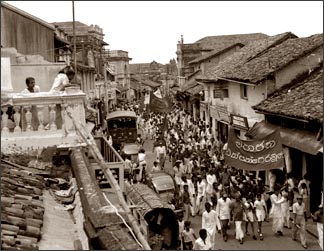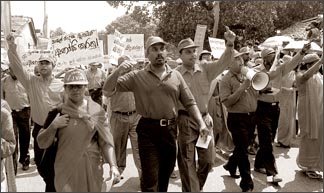May Day celebrations and cultural bankruptcy
In the face of globalization:
by Indeewara Thilakarathne
 As thousands of workers led by diverse trade unions and political
parties converge in Colombo to mark the International Workers' Day, the
significance and the relevance of the May Day should be re-assed against
the back drop of changing class relations and inescapable globalization
which has virtually changed the industrial relations throughout the
globe. As thousands of workers led by diverse trade unions and political
parties converge in Colombo to mark the International Workers' Day, the
significance and the relevance of the May Day should be re-assed against
the back drop of changing class relations and inescapable globalization
which has virtually changed the industrial relations throughout the
globe.
The history of May Day can be traced back to the campaigning for an
eight hour working day by Philadelphia workers and the subsequent
resolution adapted at the Convention of Federation of Organised Trade
and Labour Unions of the United States and Canada held on May 1, 1884.
The resolution reads as "that eight hour shall constitute a legal day's
labour from and after May 1, 1886."
However, the declaration of the May Day as International Workers' Day
was made by the Congress at its Second International held in Paris on
July 14, 1889 coincided with the centenary of the fall of Bastille
following the French revolution.
The Congress resolution states, "The Congress decides to organise a
great international demonstration, so that in all countries and in all
cities on one appointed day, the toiling masses shall demand of the
state authorities the legal reduction of the working day to eight hours,
as well as carrying out of the other decisions of the Paris Congress."
 In 1891, May Day was, for the first time, celebrated in Russia,
Brazil and Ireland. Chinese celebrated the first May Day in 1920
followed by India which celebrated first ever May Day in 1927 with
demonstrations held different cities including Calcatta, Madras and
Bombay. In 1891, May Day was, for the first time, celebrated in Russia,
Brazil and Ireland. Chinese celebrated the first May Day in 1920
followed by India which celebrated first ever May Day in 1927 with
demonstrations held different cities including Calcatta, Madras and
Bombay.
The May Day celebration in Sri Lanka was consequent to the advent of
trade unions and leftist political parties. The Ceylon Labour Union, the
first trade union founded by veteran trade unionist A.E. Gunasinghe on
September 2, 1922, was credited with holding the first May Day
demonstration in Colombo.
The Lanka Sama Samaja Party (LSSP) which is the first political party
established in 1935, held its first May Day rally in 1936 at Paris Park.
It was presided over by Colvin R. de Silva. The Communist Party held the
May Day in 1944 with large number of its supporter.
Although May Day was celebrated as early as 1922 in Sri Lanka, it had
not been a public holiday until 1956. It was T.B. Illangaratne, then
Minister of Labour in S.W.R.D. Bandaranaike's Government who declared
May Day as a public holiday.
Perhaps the most colourful May Day rallies and processions were
conducted by the leftist parties including Lanka Sama Samaja Party (LSSP),
Communist Party of Sri Lanka (CP) and the JVP led by its charismatic
leader Rohana Wijeweera. The trade unions also conducted May Day rallies
at different venues in Colombo.
May Day rallies were held under different themes, generally to air
the grievances of the working class and with the intension of improving
their working and living conditions.
Cultural degradation
However, May Day processions increasingly became platforms for
politicians to attack their political opponents and features such as
fancy dress parades mimicking the political figures included in the May
Day procession deviating from the founding objectives of the May Day.
It has been degraded to such an extent that a woman with plastered
eye was deployed in the May Day procession organised by the United
National Party to attack the former President Chandrika Bandaranaike
Kumaratunga who lost an eye in a LTTE suicide bomb at Town Hall.
It has also become a gory feature that a culture of virulent
attacking women who try to break the conventional role, symbolizing
cultural and ideological bankruptcy on the part of the political leaders
who relied on cheap tactics of herding their members in fleet of buses
to Colombo, offering them liquor and food and music. The music is
provided by a pop-band and play songs from an adjacent platform to the
main stage which is occupied by political leaders.
It is the cardinal responsibility on the part of the political
leadership of the country to up lift the standard of public taste of the
nation instead of lowering it , making Sri Lanka a cultural desert.
If the political leaders address rallies on May Day, their focus
should be on improving the economy and the Human Development Index and
also the sustainable development of the country rather than trading
insult against one another. Otherwise the nation will dramatise the
shameful conditions in front of the political podiums depicting the
deplorable state of the bankrupt political culture.
Leftists and socialists refined the nation
It is best that the political parties leave the May Day for workers
and Trade Unions to celebrate "heir day."
However, the leftist political parties, especially LSSP and CP have
not only a moral right to celebrate the May Day as the workers' rights
are those won by them through agitations but also for their significant
contribution in educating the masses and protesting against social
scourges such as castisim, racism, communalism and even regionalism
which had always been a stumbling block to development of human
capitals.
Their contribution towards building an educated and refined nation is
historic. Iconic figure such as Peter Keunaman's illustrious political
career spanning decades bear testimony to the service he rendered as
Minister of Housing albeit he did not propagate his contribution.
During his short spell as the Minister of Housing, manifold housing
projects came up compared to those who hilariously counted on private
houses put up in the neighbourhood of the housing projects as those
inspired by the project and exploited the openings of the housing
projects as an image building exercise at the public expense.
Changing scenarios
In the face of the globalization and the manifold changes that
brought about it on local situations, the working class should also
change the traditional approach to settling industrial disputes and the
weapon of striking should be used as a last resort as the modern day
industrialists and investors can transfer the capital across boundaries
with much ease against world wide investment friendly climate.
The global capital market is increasingly becoming volatile,
especially, against the back drop of looming energy crisis and prospect
of rising oil prices, the political stability, industrial peace with a
skilled work force have become essential condition for an investment
friendly environment.
As the factories have to meet their targets, a wild cat strike may
incur a loss amounting into millions. Especially strikes in the vital
sectors such as port and air port should be averted by trade unionists
and their affiliated political parties as they will not threaten the
employment of those who work in these vital installations but also
endangering the national economy.
It is the responsibility of the trade unions and their members to
make May Day meaningful by agitating for the protection of workers
fundamental rights and to win their demands through negotiations with
the employers rather than resorting to strike action at the first
instance of a dispute.
[email protected] |
